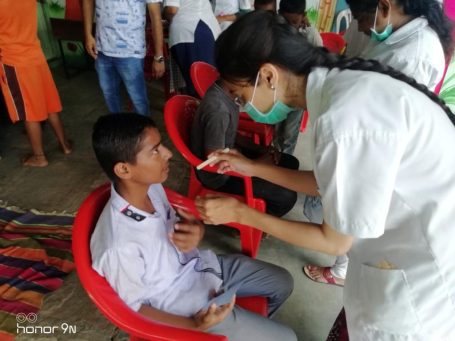State-funded healthcare is in a poor state. There is a lack of doctors, nurses and health centres, especially in rural areas.
There are no medical facilities in many villages.
The situation is exacerbated by poor hygienic conditions, such as a lack of access to clean drinking water and sanitary facilities, as well as malnutrition. Similar conditions prevail in the urban slums.
Prerana enables people in its neighbourhood to have regular health checks. Our girls are also given the opportunity to complete training in healthcare.





In Indian society, which is predominantly male-dominated, women are still severely disadvantaged despite the legal equality of the sexes.
Traditionally, women were given a dowry on marriage in order to be able to set up their own household. Although this has been prohibited by law since 1961, such a dowry is still often demanded by the bride's parents for purely economic reasons. In some cases, the required ‘dowry’ exceeds the annual income of the bride's family. Occasionally, so-called dowry murders occur when the bride's relatives are unable to fulfil the high demands after the marriage. This dowry problem contributes significantly to the fact that girls are generally held in lower esteem than boys or are even considered undesirable.
Our task is therefore to empower girls in particular and support them in their efforts not to enter the marriage market immediately after leaving school, but to complete an apprenticeship and gain a foothold in the labour market in order to be financially secure later on



Wir benötigen Ihre Zustimmung zum Laden der Übersetzungen
Wir nutzen einen Drittanbieter-Service, um den Inhalt der Website zu übersetzen, der möglicherweise Daten über Ihre Aktivitäten sammelt. Bitte überprüfen Sie die Details in der Datenschutzerklärung und akzeptieren Sie den Dienst, um die Übersetzungen zu sehen.

